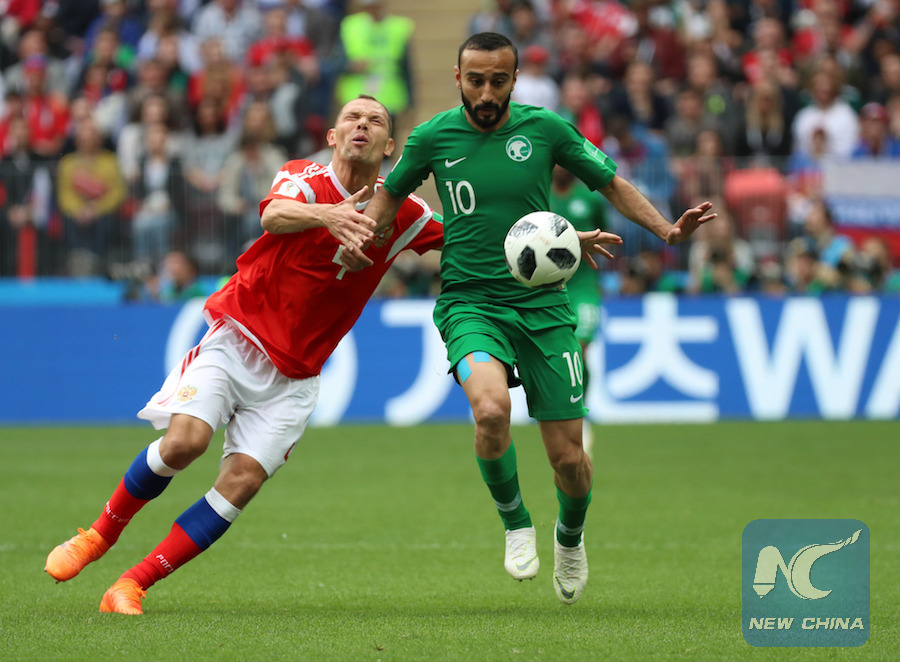
Logo of the Chinese brand Wanda, one of seven FIFA's global partners, showed at the side of the World Cup 2018 opener between Russia and Saudi Arabia in Moscow on June 14. (Xinhua/Yang Lei)
By sportswriter Wu Shuguang
MOSCOW, June 14 (Xinhua) -- As FIFA 2018 World Cup is around the corner. Chinese football fans in Moscow may be thrilled to see the presence of familiar Chinese brands like Wanda, Hisense, Vivo and Mengniu, despite China has suffered early exits from its last four World Cup qualifiers since 2002.
"They are very eye-catching, especially Dalian Wanda, one of seven FIFA's partners. I feel very proud," said Wang Lei, a Chinese fan from Shandong Province, after he paid a visit to Luzhniki Stadium Tuesday.
Actually, there are a lot Chinese elements at this year's tournament besides the above four names like China-made mascots and souvniers. Other brands include four regional supporters of 2018 FIFA World Cup Russia for Asia, such as the electric scooter company Yadea; LUCI, a technology and entertainment experience company specializing in virtual reality; and DIKING, leading brand in men's business attire in China.
One reason for wide Chinese brands presence at Russia World Cup is the withdrawal of western brands like Johnson & Johnson and Castrol.
According to the Guardian, Simon Chadwick, professor of sports enterprise at Salford University, said the lack of demand from western companies to sponsor the World Cup in Russia, and Qatar in 2022, has left FIFA "desperate for cash, and Chinese companies spotted the opportunity for a relatively cost-effective way to get their brands in front of billions of global eyeballs".
More importantly, after 40 years' reform and opening-up, Chinese companies are eager to display their brands to the world in an effort to get globalized.
Sports marketing proves surely a quick way for regional brands eying globalization.
Hisense, one of China's largest consumer electronics companies, became an official sponsor of the 2018 FIFA World Cup last year.
Hisense has access to marketing opportunities both on and off the pitch, and Hisense televisions is the official televisions of the competition.
Liu Hongxin, President of the Hisense Group, said Hisense has gained a lot of experience and seen strong brand growth through sports sponsorships over the years.
"We believe that the competition will vastly improve global awareness and economic value for Hisense as a truly international brand. The FIFA World Cup brings together the highest levels of competition and prestige in global football, making it the perfect sports event for us to be a part of," added Liu.
Hisense's international strategy has partly been engaging in sports marketing to raise brand awareness. Hisense has sponsored major sporting events and teams, including UEFA EURO 2016, the Australian Open, and Germany's FC Schalke 04.
According to Hisense, the sponsorship of EURO 2016 in France helped a 60 percent increase in television sales in Europe in the second quarter of 2016. It is expected that the partnership will see Hisense brand reach over 200 countries and regions, greatly enhancing its international brand exposure.
Sam Burne James, news editor of PR Week, said the presence of Chinese brands at World Cup will stay for a long time, according to the Guardian.
"Chinese companies get two things from sponsoring the World Cup. The first is access to western audiences that they will sooner or later be trying to win over, as their companies expand. The other is a cosmopolitan veneer to their brands, which they hope will resonate with their sizeable domestic markets,"James said.
The dominant presence of Chinese firms at FIFA World Cup is a sign of football's growing influence in China, as the world most populous nation have put up a goal to be a world football superpower by 2050, and qualify for the World Cup, host the World Cup and win the World Cup finally.
According to a report by BBC that Nielsen's survey showed interest in football in China increased from 27 percent of the urban population in 2013 to 32 percent in 2017, with three-quarters of those who said they like the sport aged under 34.
FIFA confirmed on June 7 that over 40,000 tickets out of 2.4 million have been purchased by Chinese fans, the second-largest fan source country after the United States for those failed to reach the tournament. The number is subject to change as the tournament kicks off.
Contrary to former World Cups in Brazil and Africa, Russia World Cup has political and geographical attractiveness to Chinese fans. And as the income grow significantly for ordinary Chinese, they are willing and affordable to engage with the sport in a closer way.

